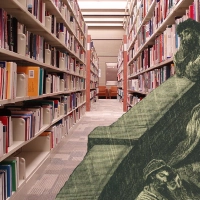The Artifce, the Artificers, and the Art World
Many an artist has known the taste of poverty. Thus, to honestly assess the history of art requires—at least—some recognition of the important role that “patrons of the arts” have played in the lives of many artists. Though, generally speaking, “patron of the arts” is just polite shorthand for “rich.” Albeit it is a descriptor for a certain caste of the wealthy: those who have purchased enough material items that they can now invest in “priceless” items such as art, or artists. After all, a fleet of fancy cars seems so petty next to walls covered in paintings.
But are the young and wealthy of today engaging in this pursuit? Are they demonstrating their bourgeois bona fides by snatching up the work from pricy gallery walls? Or is such behavior an old money habit?
This concern is the focus of Alice Gregory’s recent New York Times article: “Does Anyone Here Speak Art and Tech?” A piece that chronicles the attempts by Chelsea galleries (as in NYC) to ensnare the interest and wallets of the young tech rich. At first glance it seems like it could be a hilarious piece of social satire—skewering the wealthy and the art world elite on the end of the same opening night toothpick—but, alas, I doubt that satire was Gregory’s intent.
Gregory describes the problem thusly:
“though software engineers and art dealers may pass one another on the High Line, the worlds they inhabit could not be less alike; parallel universes that rarely intersect. And considering their net worths, technology innovators and the venture capitalists who back them are not collecting much art, according to people in both the tech and art worlds.”
Woe is the future of art! These introverted tech-creators, wiling away their hours cramming the history of culture into the binary glow of the computer screen! As they busily mutate what passes for culture, do they not realize that they owe it to the art world to buy a painting!? How can the designers of Apple products not want to buy a still life of apples or an abstract rendering of the fruit!? Here’s more from Gregory:
“Sima Familant, a New York art adviser, said she thought the tech industry had almost an obligation to become more engaged with art.
“If these are our next Rockefellers, Carnegies, Fricks, whatever you want to say in terms of our wealthy American elite, then why aren’t they supporting culture?” she asked.”
These techno-philistines! Have they no appreciation for the arts!? Don’t they realize that…oh…I don’t feel like faking this outrage, Besides, there’s no reason to fear, as Gregory notes:
“there are signs that this kind of hesitation is evolving. At last month’s Armory Show, a bevy of tech-world transplants browsed side-by-side with men in Hedi Slimane suits and whippet-thin women wearing coats constructed in Copenhagen.”
Phew! We can all breathe a sigh of relief. The rich will continue to keep the art world a cloistered community for themselves, and the new rich will learn that if they really want to be members of the club that they have to smile and nod and drink wine while being convinced that the painting before them is really worth all of those extra zeroes. And all us commoners can come and look…as long as we remember this: we do not belong. You may consume this culture, but it is not yours.
There is something darkly amusing and slightly absurd about the world that is described in Gregory’s article. It simultaneously encapsulates much of what passes for the “art world” these days whilst bearing less than a mad Dadaists prank’s similarity to art and less than a drunken surrealist’s similarity to the world. It is the type of article that can make it easy to sigh and say: “well, no wonder most people don’t give a toss about art.”
When encountering articles like Gregory’s, ones that describe the passing of the golden baton from one rich group to another, articles that extol the wealthy for their support of “culture” it is worth recalling the words of the poet and philosopher Herbert Read:
“The whole of our capitalist culture is one immense veneer: a surface refinement hiding the cheapness and shoddiness at the heart of things. To hell with such a culture! To the rubbish-heap and furnace with it all!” (30)
These new tech-millionaires are the manufacturers of this veneer, this surface refinement, the shiny toys that hide the true shoddiness at the heart of things (what is planned obsolescence but planned shoddiness?) and the realm in which they are enriched so that they can “support the arts” is a farcical one. And even as they construct the world of surfaces this “art world” becomes a distracting veneer for the new rich. A society’s shoddiness can be hidden by a five hundred dollar tablet or by a fifty thousand dollar rendering of Moses’ tablets on a dining hall tray.
In what way does turning art into a shopping experience for the rich actually support art? Have wealthy “patrons” played important roles in supporting many artists? Certainly, but they have also helped enshrine the artist and the art world in a citadel far more guarded than the academy. Thus art becomes something ever more divorced from most people’s daily experiences, it is the “Art world” never the attempt to bring more of the energy of art into the world which we inhabit.
And to the artists whose work goes from the canvas to the expensive loft walls Read would add (italics in original):
“To hell with the artist. Art as a separate profession is merely a consequence of culture as a separate entity.” (23)
Art and culture are the sanity of a healthy society and the sorry state of the two in the here and now says quite a bit about the state of our society. Gregory’s piece is interesting, but in the dancing of the tech elite and art elite there is nothing new. It’s just rich people buying art and holding fast to the cultural reins. And as to this I would simply say:
“To hell with such a culture!”
The above quotes come from:
Read, Herbert. To Hell With Culture. Shocken Books, 1963. (Routledge has re-published this more recently)










